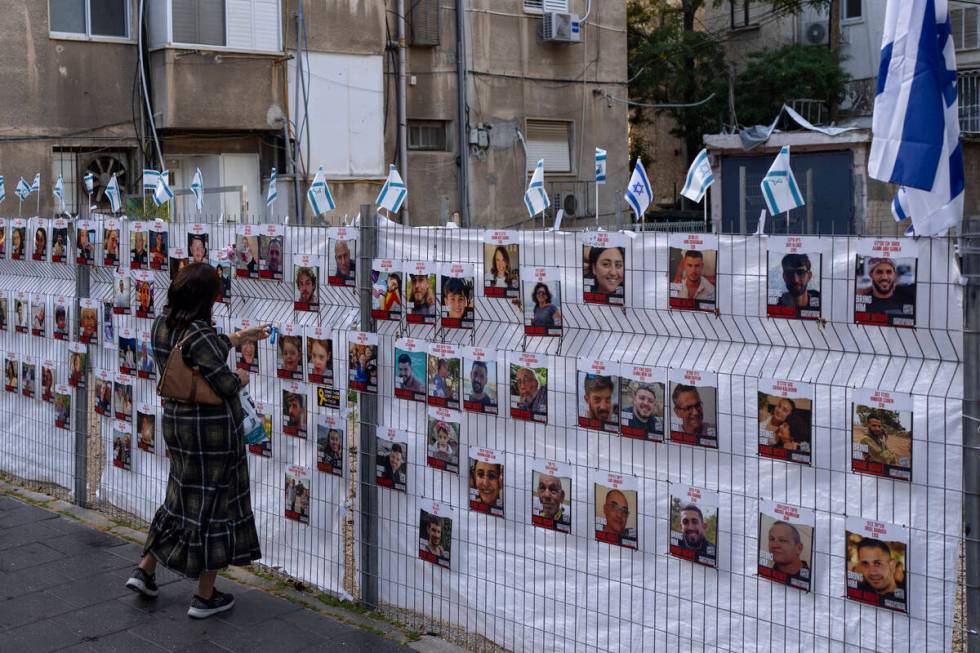Israeli official says hostage release won’t take place before Friday

JERUSALEM — Israeli Prime Minister Benjamin Netanyahu’s national security adviser says a planned hostage-for-prisoner swap with Hamas has been delayed until at least Friday.
In a statement released late Wednesday, Tzachi Hanegbi said that contacts on the deal were continuing. “The release will begin according to the original agreement between the parties, and not before Friday,” he said.
The swap was to take place as part of a four-day truce in the war in Gaza that was expected to begin on Thursday.
The cease-fire is set to take effect at 10 a.m. local time Thursday, according to Egypt’s state-run Qahera TV channel.
The surprise announcement came after Israel and Hamas earlier Wednesday agreed to a four-day cease-fire — a diplomatic breakthrough that would free dozens of hostages held by terrorists as well as Palestinians imprisoned in Israel, and bring a large influx of aid to the territory.
Prime Minister Benjamin Netanyahu, joined by the two other members of his special war cabinet, told a nationally televised news conference that the war would resume after the truce expires. Israel’s goals are to destroy Hamas’ military capabilities and return all 240 hostages held captive in Gaza.
“I want to be clear. The war is continuing. The war is continuing. We will continue it until we achieve all our goals,” Netanyahu said, adding he had delivered the same message in a phone call to President Joe Biden. He also said he had instructed the Mossad spy agency to hunt down Hamas’ exiled leadership “wherever they are.”
Israeli troops hold much of northern Gaza and say they have dismantled tunnels and much of Hamas’ infrastructure there. But Israeli officials acknowledge the group’s infrastructure remains intact elsewhere.
Netanyahu’s announcement Wednesday appeared to be aimed at public concerns that a truce will lead Israel to halt its offensive before achieving its goals.
Just days before the truce, Israel said it was determined to take its ground offensive into the south.
Palestinian terrorists continued firing rockets at Israel throughout the day, without causing casualties.
A diplomatic breakthrough
The announcement of the truce capped weeks of indirect, stop-and-go negotiations to free some of the roughly 240 hostages taken by Hamas and other terrorists during their Oct. 7 raid. Egypt and Qatar, along with the United States, helped mediate the deal.
Fifty hostages are to be freed in stages, in exchange for the release of what Hamas said would be 150 Palestinian prisoners. Both sides said they would let go women and children first.
Israel said the truce would be extended an extra day for every additional 10 hostages freed by Hamas. Hamas said hundreds of trucks carrying humanitarian aid — including fuel — would be allowed to enter Gaza.
Netanyahu said the deal also included a provision for the International Committee of the Red Cross to visit the hostages in captivity.
Biden welcomed the deal, saying Netanyahu committed to supporting an “extended pause.” Several nations, including Britain, France, China and Russia, also welcomed the agreement.
Qatar’s prime minister, Sheikh Mohammed bin Abdulrahman Al Thani, said he hoped the deal would eventually lead to a permanent cease-fire and “serious talks” on resolving the Israeli-Palestinian conflict.
Israel’s Justice Ministry published a list of 300 prisoners eligible to be released, mainly teenagers detained over the past year for rock-throwing and other such offenses.
Strikes continue
The war erupted when several thousand Hamas terrorists broke into southern Israel, killing at least 1,200 people, mostly civilians, and taking hostages.
Weeks of Israeli airstrikes in Gaza, followed by a ground invasion, have killed more than 11,000 Palestinians, according to the Health Ministry in the Hamas-run territory. It does not differentiate between civilians and terrorists. Hamas has been designated as a terrorist organization by the United States, Canada and the European Union.
Israeli troops and tanks are expected to remain in place around northern Gaza during the truce. Israel says it has killed thousands of Hamas fighters.
An airstrike overnight hit a residential building in the southern town of Khan Younis, killing 17 people, including children, said Ahmad Balouny, a relative of the deceased. Outside Khan Younis, workers dug a mass grave for 111 bodies that Israeli authorities handed over after troops took them from Shifa Hospital and other parts of northern Gaza. Israeli troops took the bodies apparently for DNA analysis amid the search for hostages in the north.
Strikes also leveled buildings in the Nusseirat refugee camp and the city of Deir al-Balah in central Gaza. The city’s Al-Aqsa Martyrs Hospital said 128 bodies were brought in overnight after strikes.
In northern Gaza, a source said about 60 bodies and 200 people wounded by heavy fighting were brought into the Kamal Adwan Hospital overnight.
Deal could divide Israelis
The return of hostages could lift spirits in Israel, where their plight has gripped the country. Families of the hostages — who include babies and older adults — have staged mass demonstrations to pressure the government to bring them home.
Ofri Bibas Levy, whose brother, sister-in-law and two nephews — aged 4 and 10 months — are among the captives, said the deal puts the families in an “inhumane” situation.
“Who will be released, who won’t?” she asked. “No matter which way it happens, there will still be families that will remain worried and sad and angry.”